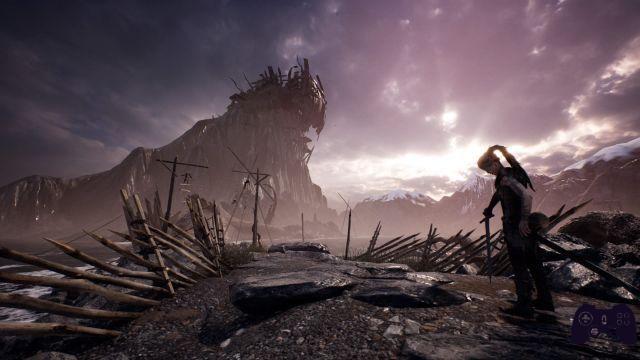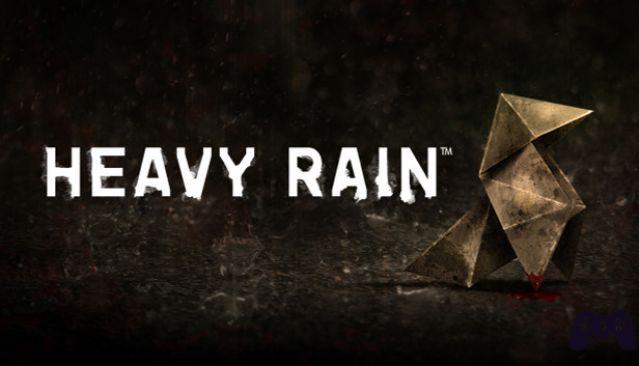
Eight years ago, David Cage's Quantic Dream promised a narrative revolution in the gaming market, and Heavy Rain would be the prophet. Today we explore what went wrong, what could have been better… and why.
In February 2010, Quantic Dream released Heavy Rain, exclusive on PlayStation 3 to promote the potential of the new generation. The history of the great work of David Cage is known to anyone who has lived that generation on their skin: a mysterious teaser that announces a "casting" for a Quantic Dream game, a teaser that worked more as a tech demo than a real trailer. Initially proposed to Microsoft, Heavy Rain it then moved to Sony consoles, after the American company had requested changes to the storyline. And finally, after four years of development, the title has finally hit the market, bringing with it an intriguing weave, interesting characters and a good dose of narrative maturity.
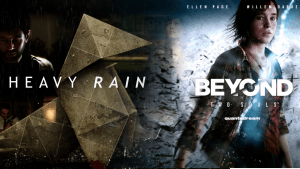
To learn more:
Heavy Rain and Beyond: Two Souls Collection
In short, the premises were all there - and far be it from us to think that Heavy Rain is a bad game. But it is undeniable that something went wrong in the course of development and design; so much so that Heavy Rain continues to be talked about today, especially when it refers to consistent holes in the plot and incredible missed opportunities.
CAUTION: Before moving on, a quick note. This article contains heavy spoilers on Heavy Rain, even going so far as to reveal the identity of the Origami Killer. If you haven't played the Quantic Dream title yet and plan to do so soon, refrain from continuing. We have warned you.
Heavy Rain's Worst Plot Holes
David Cage is a great director, but he has some problems with storytellingIt was enough a look at the Detroit demo, recently released on the Store, so that the writer's jaw fell to the ground with a thud, not too deaf. For a film buff, David Cage's videogame direction is incredible, with an excellent use of editing, the scale of the floors, facial expressions and acting. It is said that a good director is able to convey emotions in images, and David Cage succeeds; pity that, when he decides to pick up the pen, the good French does not seem to love narrative coherence and general organicity. Hoping that doesn't happen in Detroit too (may Kojima send us good), Heavy Rain is a prime example of the disasters that Cage is capable of wreaking, when given carte blanche. At least, on a strictly narrative level.
To give you a little idea of what we are referring to, we like to leave you a video of the well-known series here Game Sins. Suffice it to say that, in the end, the Sin Counter reaches a surprising "275" (although, as usual, many of them are to be taken with a lot of irony).
As our webmaster expertly stated off-air, "Heavy Rain works fine until the finale - then it all falls apart." There is no lack of consistent holes even at the beginning of the experience, or obvious inconsistencies that do not seem to be explainable, but you will see how, actually, most of the plot holes will be concentrated mainly in the final part of the game. Starting with the characters.
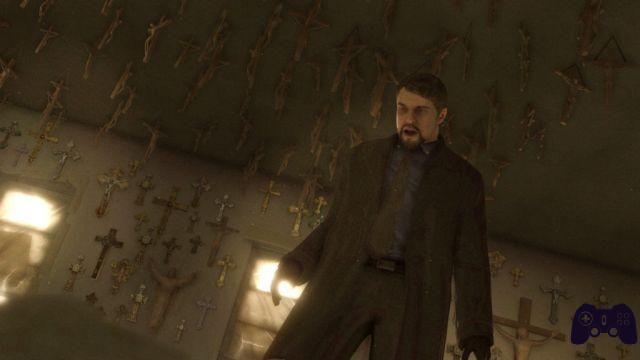
Plot and Characters: Broken Ties
Madison Paige is linked to some of the worst plot holes in the game
One of the holes in the plot that has caused the most discussion is certainly the one related to Madison Paige, the beautiful reporter who figures among the protagonists of the game - and, as already announced, has to do with the final part of the experience.
Leaving aside the problem of wanting to escape an explosion by locking yourself in a refrigerator (and we will refrain from naming that other entertainment work who did a similar thing - we don't even link it to you in the bold text, look), dear "Maddy" will be faced with a choice, once she comes out of the burning building: call Ethan, to warn him of the impending danger, or call Norman Jayden, an FBI agent she says she can trust - but that really he has never seen in his life, or at least not in the events narrated in the game.
On no occasion, in any instant, could Madison have retrieved Jayden's number, or talked to him, or investigated his figure, or even heard his name. Jayden is a complete stranger to Madison's eyes; yet, the girl can call him to warn him of the danger, prompting him to go to the abandoned warehouse to stop the killer.
Madison has no reason to know many of the characters in the game. Yet, in the course of the finale, the game tries to make us believe otherwise, without ever having laid the foundation for such a reality.
Of course, it could be argued that, being a reporter, Madison may have known her name in some way, perhaps seeing him among the people on the case. But why call him in that exact moment, why trust him, rather than an ordinary cop?
Unsuccessful suspense attempts
Nor is it the only case of "unspecified bond" between the characters, nor the only one involving Madison. When the girl goes to the hospital to meet the killer's mother, the latter whispers the name of her surviving brother into her ear, carrying Madison. to a totally unwarranted reaction: the girl has never had contact with Scott Shelby, nor has she ever had the opportunity to know him. Why, then, would he be in shock at the revelation of his name? Here it is clear Cage's attempt to prolong the suspense, keeping the killer's identity hidden for a little while longer. A somewhat "cheap" attempt, to be honest, undoubtedly badly conceived and badly told.
But the worst problem is certainly in the figure of Scott shelby.
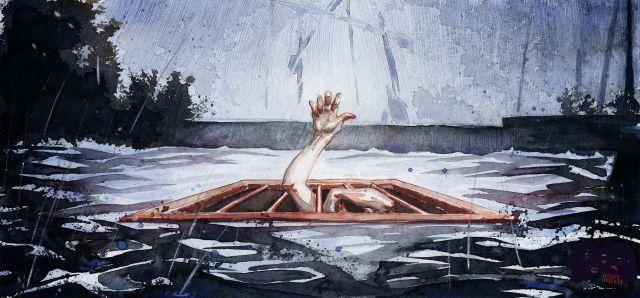
A Killer who doesn't believe it
Spoiler: Scott Shelby is the Origami Killer. Now that the pebble is gone, let's analyze the figure of this potentially wonderful character, who has just had a couple of accidents along the way.
Scott Shelby's Red HerringLet's start from an assumption: David Cage's intention was undoubtedly to build a "red herring“, Which in fiction is a technical term to indicate a“ red herring ”, a narrative distraction. By allowing the player to take on the role of Shelby and representing him as one of the "good guys", Cage wanted to divert attention from the private detective to shift it to Ethan, which is repeatedly pushed by history as the "real" Origami Killer. And the whole thing would have worked too, if aided by an underlying consistency. But we'll talk about Ethan shortly.
The problem is that Shelby is not a hidden "villain", he is simply a poorly told "villain". On no occasion does he do anything suspicious, his thoughts (which can be heard by the player) always seem genuine, and repeatedly goes further than necessary to investigate suspicions, even knowing full well that he is the Origami killer. In general, it is clear that Scott Shelby lacks a giant dose of consistency. And that's a shame, with its narrative background.
In short: after losing her brother in an accident, Shelby has been looking for the "perfect father" for years, the one her father never was, the one willing to risk his life to save his son. To do so, he kidnaps a child and subjects the parent to tests, destroying the clues of anyone who fails to pass his tests.
Shelby had potential; it's just badly toldAs we are told on the ending, Shelby collects evidence from the parents of her victims, posing as a private investigator, so as not to leave any trace to the police. What is not clear is the why these parents did not take it to the police, even after refusing to participate in Shelby's rehearsals, and because it took Shelby himself two years to get it all back. Not only: as already mentioned, despite knowing he is the killer, Shelby will investigate the son of a business tycoon, going far too far in his research for no apparent reason. It is as if David Cage only finally decided that Shelby was to be the killer, when the story was already written in full.
But, linked to Shelby, there is also the biggest plothole of all. When Scott and Lauren (a secondary character) go to the typewriter expert, the man dies mysteriously in a strange off-screen, and Shelby finds himself surprised at his death. Later, we discover that he was the one who killed him, in a split second too short to be realistic, during a close-up on Lauren. A forced twist, which certainly could have been studied in a thousand better ways.
It is the golden rule of a storyteller: never assume that the reader is stupid. The public will pay hard cash for your work, and rest assured that they will notice any trick you want to offer them.
All of this would have worked wonders if Scott Shelby had had some sort of multiple personality disorder. But it is not, on the contrary: in the finale, Shelby is shown as a man perfectly aware of his actions and his identity, and it is not suggested in any way that he has some sort of internal conflict. Faced with all these details, the player feels teased, and not in the way a The Prestige or a The Phantom Pain: feels teased by an elementary and poorly studied plot twist, one that leaves you with more questions than answers.
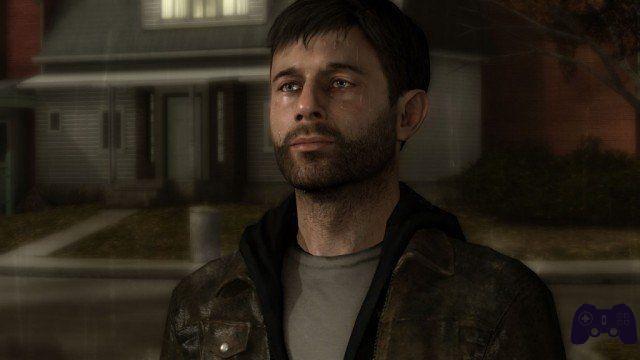
The Supernatural: Ethan and Shelby
The Origami Killer seems to be chosen at randomOnce you reach the end, you get the impression that, to choose your Origami killer, David Cage sat in front of a blackboard with all the characters, threw a dart, and it landed on Scott Shelby. But why all this? Why so many inconsistencies, carelessness, so many holes in the plot?
As is often the case, the answer may be in the cut content of Heavy Rain.
Initially, as in most of David Cage's titles, Heavy Rain it must have had some supernatural element. It happened in Fahrenheit, it happened in Beyond: Two Souls, and it could happen in Detroit too, somehow. Instead, a few months after the end of development, Quantic Dream decided to cut the supernatural out of the game, taking it to a more realistic level.
And that's where Ethan comes in, the unfortunate father protagonist of the game, who finds himself looking for his son Shaun, kidnapped by the Origami Killer. At the beginning of the experience, right after the prologue, Ethan will have at least two blackouts, which will wake him up at a mysterious intersection in the middle of the city. Either way, Ethan will have an Origami in his hand; but the reason for these blackouts is never explained to us, nor is the link between him and the Origami that he finds in his hand ever explained. With this gimmick, the game suggests that Ethan may be the Origami Killer, perhaps with some Fight Club-style split personality disorder; but it never gets too deep, and the holes are never filled.
This plot hole is quite consistent, and is due to the lack of the supernatural within the game.
Heavy Rain foresaw the supernatural behind the whole storyAt first, Ethan he should have had several dreams and visions, placed exactly between the start of the blackouts and his awakening. In these dreams, Ethan would see the killer's victims floating in the water, and the water motif would be incredibly present in these dream sections, establishing a mystical contact of some kind between the boy and Scott Shelby.
In fact, Scott Shelby was present when Jason, Ethan's first son, he died hit by a car. According to several interviews and videos released by Quantic Dream, the moment when Ethan suffered his head injury would have established some kind of supernatural contact between him and Shelby, connecting them in different ways and giving an explanation to many of the plot holes that, eventually, they appeared in the game at the end of development. In short, Heavy Rain would have been much more complete and coherent had the content not been cut; and, in general, the DLCs planned by Quantic Dream were supposed to delve into all the characters, giving them more depth and a background on their personal stories.
All of this never happened: of the several Chronicles announced by Quantic Dream, only the first has actually been published, and the supernatural never made its way into the game, leaving several questions about Ethan's personality and the strange bond between him and the killer. In fact, Ethan wakes up every time in Carnaby Corner, where Shelby grew up and lost her little brother. But all of this will never be explained by the game - and, when you look at the complete work and what it could have been, it is indeed a great shame.
And Detroit?
Now, we just have to wait for the release of Detroit: Become Human, hoping that things are better than in the past. It is not clear if there is any content cut even in that work, and it is far too early to judge: the demo did not provide enough elements of analysis. What is certain is that the maturity of the topics covered has not been lost, and the focus on the narrative and on the relationships between the characters seems to have remained. As well as the beauty of directing, acting and love for stories.
For our part, we will approach Detroit with a mixture of curiosity and suspicion. The writer is intrigued by what he has already been able to see, but he is also afraid that history will repeat itself, in some way; only time will tell.
Meanwhile, there are just over two weeks left before the game is released, and the hope that Cage didn't do any damage is big enough. Also because this time Asimov is involved, and with him a good part of the science fiction culture of his time; and Asimov is not joking.





